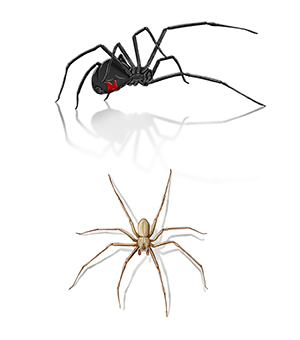A
B
C
D
E
F
G
H
I
J
K
L
M
N
O
P
Q
R
S
T
U
V
W
X
Y
Z
Click a letter to see a list of medical procedures beginning with that letter.
Click 'Back to Intro' to return to the beginning of this section.
Insect, Spider, and Scorpion Bites and Stings
Most insect bites are harmless. They may cause only minor swelling or itching. But if you’re allergic to insects, such as wasps or bees, a sting can be life-threatening. Some ticks can carry and spread serious diseases. The venom (poison) from scorpions and certain spiders can also be deadly, but this is rare. Knowing when to get emergency care could save your life.
 |
| The black widow (top) and brown recluse (bottom) are two venomous spiders found in the United States. |
When to go to the emergency room (ER)
Go to the nearest emergency room right away if you have any of the following:
-
Scorpion sting
-
Bite from a black, red, or brown widow spider or brown recluse spider
-
Severe pain or swelling at the site of bite
-
A tick that is embedded in your skin and can't be easily removed at home
-
Signs of an allergic reaction, such as:
-
Hives
-
Swelling of your eyes, lips, or the inside of your throat
-
Trouble breathing (Call 911)
-
Dizziness or confusion
What to expect in the ER
-
If you’re having trouble breathing, you’ll be given oxygen through a mask. In severe cases, you may have a tube inserted in your throat and be placed on a breathing machine (ventilator).
-
If you are having a bad allergic reaction from a sting (anaphylaxis), you may be given epinephrine. If it's known that you are allergic to bee or wasp stings, your healthcare provider may give you a prescription for an epinephrine autoinjector or nasal spray that you can keep with you at all times in case of a sting.
-
You may get antivenin (a substance that reverses the effects of poison) for some spider bites and scorpion stings. Because antivenin can sometimes cause other problems, your healthcare provider will weigh the risks and benefits of this treatment.
-
Steroids, such as prednisone, are often used to treat allergic reactions. In many cases, an antihistamine to help relieve itching may also be prescribed. These are to be taken for several days to relieve symptoms and make sure the allergic reaction doesn't recur.
Home care
-
Try to remove an insect stinger you can see. Use your fingernail, a knife edge, or credit card to scrape against the skin. Don't squeeze or pull.
-
Keep the area clean and dry.
-
Apply ice or a cold compress to reduce pain and swelling. Keep a thin cloth between the cold source and the skin.
-
You may use over-the-counter pain medicine to control pain, unless another pain medicine was prescribed. Talk with your healthcare provider before using acetaminophen or ibuprofen if you have chronic liver or kidney disease. Also talk with your provider if you have ever had a stomach ulcer or digestive bleeding.
-
Watch for symptoms that get worse or signs of an allergic reaction (see above).
When to call your healthcare provider
Call your healthcare provider or get medical care right away if any of these occur:
-
Spreading areas of redness or swelling
-
Fever of 100.4°F (38°C) or higher, or as directed by your healthcare provider
-
Increasing pain, redness, swelling, or drainage
-
Headache, weakness, chills, muscle spasms, muscle or joint aching, or vomiting
-
New rash
Online Medical Reviewer:
Chris Southard RN
Online Medical Reviewer:
Rajadurai Samnishanth Researcher
Online Medical Reviewer:
Rita Sather RN
Date Last Reviewed:
10/1/2024
© 2000-2025 The StayWell Company, LLC. All rights reserved. This information is not intended as a substitute for professional medical care. Always follow your healthcare professional's instructions.